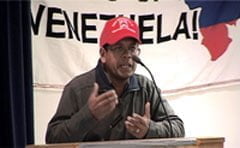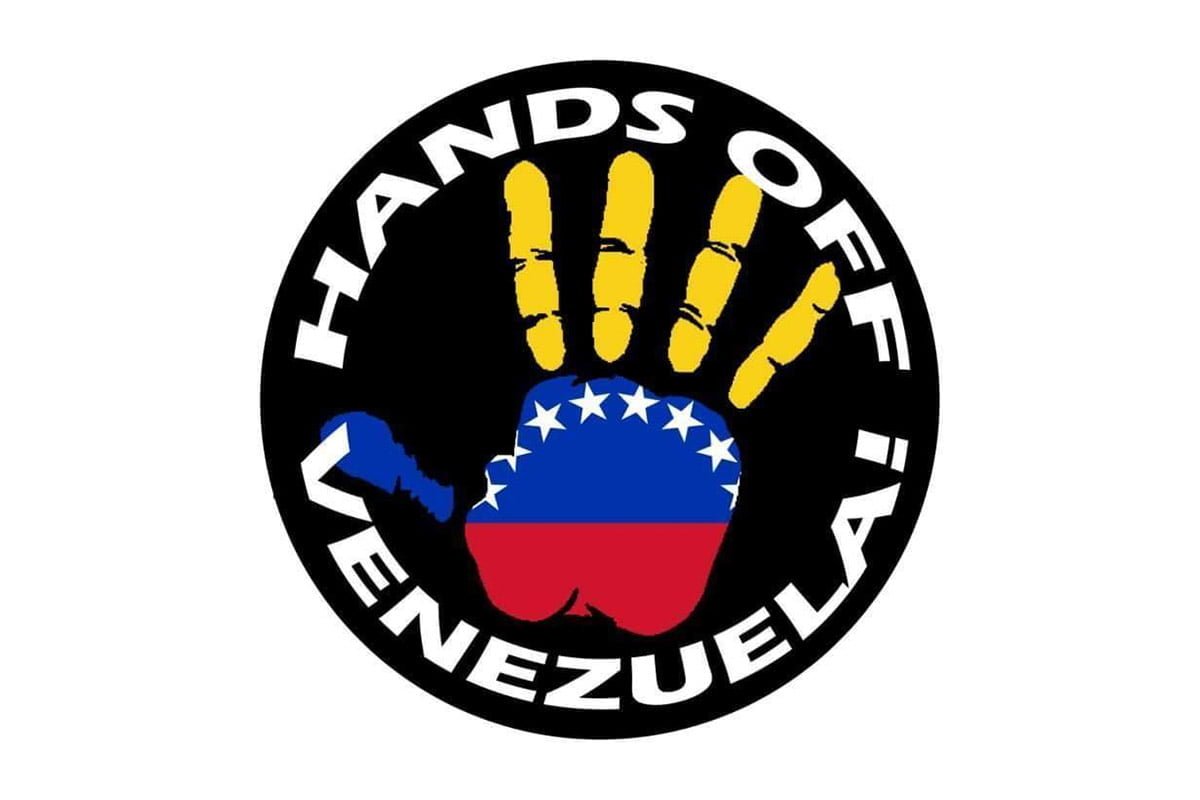Jesus Pino, a representative of the Revolutionary Front of Steel Workers
in Venezuela, visited Britain at the end of November 2008, invited by the Hands
Off Venezuela campaign to attend its National Conference in London.
While in Britain he had the opportunity to visit the offices of the
civil servants’ union PCS, where he met with Assistant General Secretary Chris
Baugh and other union officials. He also visited the headquarters of the Fire
Brigades Union, at the invitation of its general secretary Matt Wrack. Both
unions have been supportive of the Venezuelan revolution and of the Hands Off
Venezuela campaign, and were very interested to hear about the nationalisation
of the SIDOR steel plant and the struggle of workers there for genuine workers’
control and socialism. Jorge Martin interviewed him.
Could you explain who you are and who do you represent?
My name is Jesus Pino and I come from Siderurgica del Orinoco, SIDOR, a
company which has been recently nationalised and I represent the Revolutionary
Front of Steel Workers, an organisation which was set up when the company was
nationalised, with the clear aim of carrying out what President Chavez said at
the time: that the company should be productive and socialist.
Could you explain how the nationalisation of SIDOR took place?
For ten years the company was managed by a multinational, Techint,
originally from Italy but based in Argentina. For ten years the workers
suffered great exploitation, creating discontent amongst the workers, which led
to more than 400 strikes during those ten years, because of the working
conditions in the company. It is important to underline that during the 10
years of control by the multinational, 18 workers died in work accidents. In
October 2007, during the negotiation of the collective bargaining agreement a
conflict developed, until March 2008 in which the multinational refuses to
continue talks, particularly in relation to wage increases, the incorporation
of subcontracted workers to the main workforce, and pension rights.
Negotiations broke down and then the Venezuelan government intervened.
President Chavez appoints the Minister of Labour Ramon Rivero, in order to
fulfil the fair demands of the workers, but this Minister sided with the company.
The Minister proposed a referendum amongst the workers for them to accept the
company’s proposals. The union SUTISS, representing more than 3,800 workers,
did not accept the proposal of the Minister and organised its own referendum,
where it received the support of more than 80% of the workers. There was then a
demonstration and the Minister and the regional governor sent in the forces of
repression, resulting in a number of workers being arrested and injured. The
president got to know about this, removed the Minister of Labour and sent the
vice-president directly to take part in the talks. Then, in April, during talks
between the union, the vice-president of the Republic and the company, the
company refused to make any concessions, the vice-president called president
Chavez, at 2 am, and president Chavez decided to nationalise the company,
clearly because of the lack of response to the workers’ demands.
When announcing the nationalisation Chavez explained that he was against
the model of state capitalism and that he wanted the company to become a
socialist company. Could you tell us what has changed in the company regarding
the demands of the workers, and what is the position of the Front regarding
what a socialist company is?
First I would like to add that the Minister was not only removed from
the talks, but was also immediately removed from his job by the president of
the Republic.
Sorry, this was the same Minister who had played a negative role in the
struggle of Sanitarios Maracay workers, wasn’t he?
Yes, he had had a dark behaviour in his relations with the trade unions.
He had participated in a number of elections without winning any of them, and
one wonders how he became the Minister of Labour. Now, you were asking me about
the statements of president Chavez at the time of nationalisation, which were
made at the plant itself. First of all he made an appeal for workers’ unity,
because he knew that it had been the workers themselves which had forced the
different factions in the union to unite. There were three factions defending
their own interests until the workers forced them to unite around the
negotiation of the collective bargaining agreement. This nationalisation is
very important, because SIDOR is a company, which had been state-owned until
1997, then privatised, and then it has been re-nationalised. The president said:
"this company is yours" and has made repeated appeals for us to set
up workers’ councils. And this is the crucial point of a nationalisation: the
participation of the workers in the decision-making process in the company,
there can be no socialism in SIDOR unless the workers participated in the
management of the company and have control over it. Secondly, the resources of
the company have to be used to generate well-being for the Venezuelan people as
a whole. Unless these two conditions are met, then we would be repeating
previous processes of nationalisation or state-ownership, like we have next to
SIDOR, like the aluminium companies, which have been weakened from the point of
view of production because the workers do not participate in their management.
The Revolutionary Front argues for the need to set up workers’ councils, so
that we can carry out the president’s line that this company should be a model
company, but also because one could not talk of a process of building socialism
in the company unless the workers participate in its management. For now, the
capitalist structures remain. The Front drafted a document, as a result of a
three month long discussion, we gave it to management, and we are now
distributing it to the workers as our proposal and the only alternative to take
the company forward. In other state-owned companies there is a lot of
corruption, there is a lot of bureaucracy, and we think that with the workers’
councils we can avoid this, because the workers will carry out social control,
they will look after the company’s resources, which would prevent corruption.
What has been the impact of the nationalisation of SIDOR amongst workers
in other companies?
There are other companies in the region, for instance one which makes
ceramics for the furnaces, Ceramicas Carabobo, which was declared bankrupt by
the owners a few days ago, and the workers are now on struggle, demanding the
nationalisation of the company. There is another factory, Suramericana del
Aluminio, SURAL, privately owned, where the workers are also fighting for their
rights, and they have said that the only solution to their problems is
nationalisation. So SIDOR, being the largest company in the region and one of
the largest steel makers in Latin America, has become a point of reference for
the rest of the workers. I would also like to underline that the collective
bargaining agreement that was finally signed is the best in the country, better
even that that of the oil workers, so that the agreement has become a point of
reference for the workers in the country, but also the nationalisation of SIDOR
is a point of reference.
What has been the role of the working class in the Bolivarian revolution
and what should it be?
It is crucial. There will be neither revolutionary process nor socialism
in Venezuela unless the workers participate in the process. Even president
Chavez has expressed his worries because he realises that the participation of
the working class in the process is very limited from an organised point of
view. The overwhelming majority of the workers support the process, they are
aware that there is no other way out in Venezuela other than socialism, but
from an organised point of view, as far as the unions are concerned, there has
been no organised response to the process of change we are living through. Unless the workers participate in the
building of socialism, there will be no socialism.
What happened in SIDOR during the oil and economic sabotage of 2002?
Despite the fact that the company was owned by the multinational, it was
working, and in his Sunday programme ‘Alo Presidente’ the president stressed
the fact that SIDOR, despite being a private company, was still working. So a
group of employees, mainly in managerial positions made an appeal to stop the
company, but without success. We work basically with gas, and in those days the
situation with gas was very difficult. There were threats that the local mayor
next to where gas was being produced, in Puerto la Cruz, was going to cut off the
supply. The union organised a large group of workers, including two coaches,
went there and prevented this threat from being carried out. Further to this,
in Ciudad Guayana itself, the workers prevented the company dealing with the
distribution of petrol from being locked out, which would have left the
citizens with no petrol. There was scarcity, as you remember the national
government was forced to purchase oil abroad, but the monopoly companies controlling
the distribution of petrol were attempting to close it down, in order to create
chaos, and the workers played a key role in preventing it.
You are talking about workers’ councils and workers’ control, are you
saying that workers are able to run industry and society?
Absolutely. Not only they are able, but it is necessary. Without
breaking down the capitalist structures we will not be able to produce more
resources and to use those resources to improve the living conditions of all
Venezuelans. This will not be possible unless the workers run the companies.
Capitalist structures have already shown that they work for their own
interests, that they are unable to solve the fundamental problems of society.
Only through peoples’ structures can we achieve well-being in our society. It
is absolutely necessary for the workers to join in the struggle and to run the
companies.
President Chavez has opened
the debate about socialism as the only way forward for the Bolivarian
revolution. But there are many opinions about what is socialism and how to get
it. What is your opinion?
There is only one socialism. There is no other. Already the classics,
Marx, Engels, Lenin, wrote about it, they left us a legacy. There have also
been experiences, which we should not copy, but use as a point of reference.
The only way to get to socialism is through Marxism and the participation of
the workers in this process of change. Obviously, socialism cannot be exported,
or imported. We must take the classics of Marxism and apply Marxism as a
science to the peculiarities of every place. We will be building socialism,
basing ourselves on Marxism, taking into account the peculiarities of our
country, our history, our culture, etc. There aren’t different ways to build
socialism. There are different organisations which call themselves socialist,
but most of them are really socialdemocratic. In theory and in practice there
is only one way to implement socialism, and that is Marxism.
What would you say to workers and youth around the world about why they
should support the Bolivarian revolution?
The Venezuelan revolution started at a time when everybody was talking
about the end of history, so it became a point of reference for the struggle
internationally. There is a revolutionary process in the country, with the
participation of the people, and this is, I would say, a point of reference for
the peoples of the world. Above all because the revolution was born with a deep
seated anti-imperialist character and a deeply popular character, these are the
two aspects that can be taken as a point of reference in the struggle of the
peoples for national liberation and the building of socialism.
Thank you very much
Thank you.






